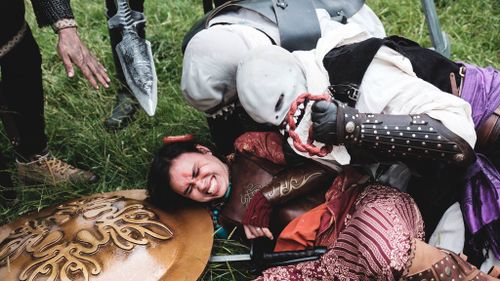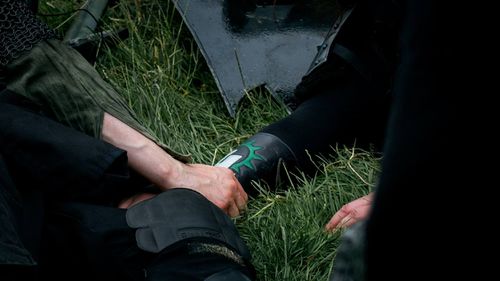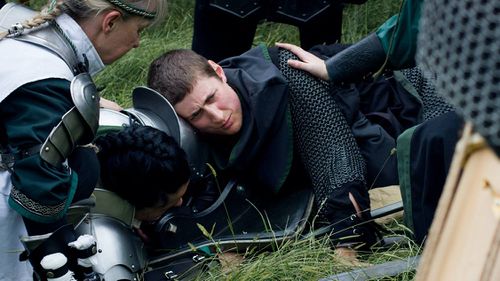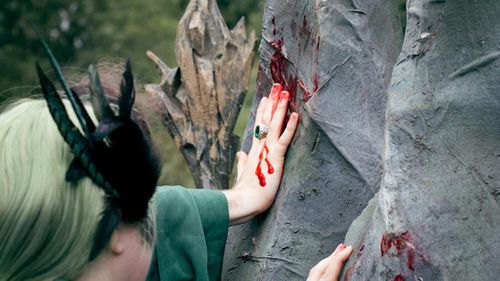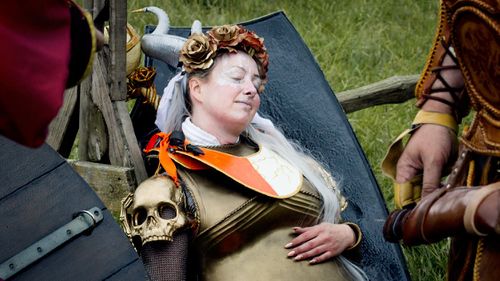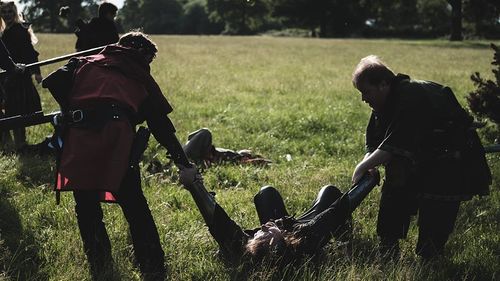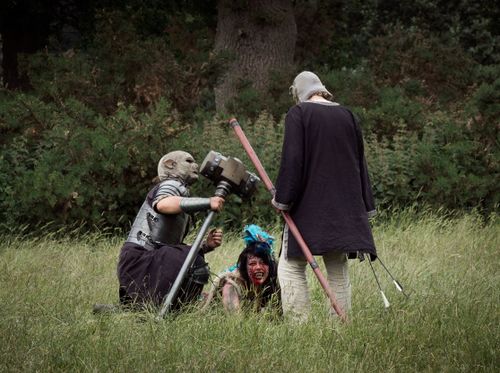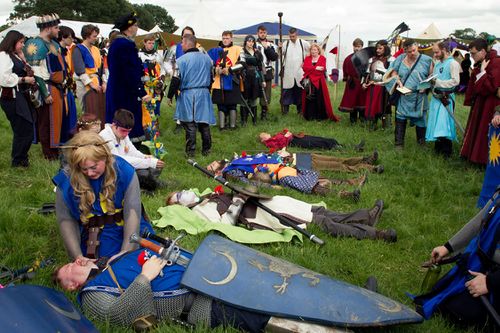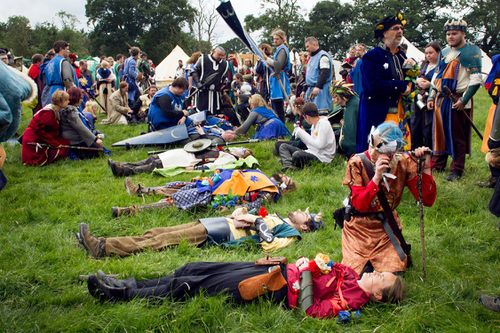382YE Summer Solstice winds of war
Overview
(This is where the overview goes).
Devil Take the Hindmost (Brass Coast)
The Drakes are in Madruga, fighting the remaining Grendel for control of the islands around Atalaya. They are supported by Freeborn corsairs and fisherfolk alike, ferried across the hungry sea in boats and ships pressed into service as troop transports. There is significant grumbling on both sides - the Marchers do not enjoy the boats and the Freeborn do not enjoy having to turn aside from their business to deliver soldiers to their destinations. Both groups enjoy having Grendel on Imperial soil even less, however, and so the matter is dealt with expeditiously - so the Drakes can get back to dry land and the Freeborn sailors get back to work.
Thanks to the efforts of Imperial heroes who struck at key targets during the Spring Equinox, there is little fight left in the orcs. Those who remain on the Brass Coast are mainly chancers, risking everything for a chance to make a profit or build a name for themselves. They are no match for the disciplined Marcher army. The situation is slightly different on the island of Atalaya - there is a solid core of Grendel troops here who do their best to to resist the army of Tom Drake - but they are outmatched, outnumbered, and outclassed.
My merry lads and lasses, those cheeky Grendel so-and-so's have been baring their arse cheeks and giving us for the last month. Their time si up. We're going to board the skiffs of our Freeborn allies and sweep the arrogant bastards from Atalaya. Slow and steady though, we don't know what traps they've laid so make sure we preserve marches lives in this steady conquest. Let them slee across the Bay if they wish, there are Corsairs in these waters no doubt, hungry for payback. Once we're done, time for foot the ball on the beach. Mitwold town Forever!
Will Talbot, General of the DrakesWhen it becomes clear they will fail to hold the Freeborn town, the Grendel garrison simply surrenders - to the surprise of many. By this point there are perhaps fifty Grendel left; their commander opens the gates of the town, and offers her spear to the first Marcher captain she sees. The orcs are currently corralled in a makeshift pen on the small island of Mariposa - the Freeborn will not suffer them to remain on Atalaya, not after all they have done and the Drakes are somewhat at a loss to know what to do with them. The captain - Innevia, daughter of Moorvain - is quite up-front about her orders, seeing no reason to conceal them. They expected the armada to return, she says. They were to hold Atalaya and Free Landing as a beachhead against a more sizeable Grendel force returning. No such force has arrived. Presumably something happened to change the plans of the Salt Lords.
Madruga, then, is once more in the hands of the Empire in its entirety.
This is not the only military activity in south-west this season, however.
On the other side of the Brass Coast, as far away from Free Landing as it is possible to get but still be in Freeborn territory, an army emerges from the hills of Reinos. Three weeks after the Spring Equinox over fifteen thousand orcs cross the border into Kahraman. For the most part, they seem to be Jotun, but many wear hoods or sashes of a bright orange hue over their armour. These orcs march beneath the banner of the firebird - a great eagle wreathed in orange flames. This design was first seen in the months leading up to the Winter Solstice last year, and is now recognisably the device of the orcs of the Lasambrian hills. Others march under more traditional Jotun standards, red banners topped with the skulls of great bears.
The Jotun under the banner of the bear take the lead; they push straight toward the town of Damata, a lightning advance that seeks to crush the defenders before they can be sure what is happening. The border watch is quickly overwhelmed, and it is pure chance their strategy is unsuccessful. A patrol from Fort Braydon catches sight of the smoke from their campfires, and sends three runners to warn the Freeborn that the Jotun have come back. As the bear army pushes forward, the orcs of the Hierro clan- and their new banners - follow in their wake. The Lasambrians are more cautious, dfensive, prepared for a trap. They secure the territory the army of the bear has claimed rather than pushing to the heart of the territory. A combination of the two strategies proves very effective - without the Imperial soldiers from the fort it is likely that the whole of Serra Damata would have fallen to them in short order.
At the same time, the Corazón range far and wide across the territory. They are clearly more interested in causing as much disruption as possible than on engaging with the scattered Freeborn defenders. The are not shy about fighting - and those who try to resist are dealt with without pause - but they do not go out of their way to kill anyone who does put up a fight. Instead they raid caravans and farms, rob paradours and mines, and even take the time to carry away crystal mana from any mana site they encounter. Anything that might be useful to the defenders of Karhaman appears to be fair game. Nowhere is safe - bands of Corazón orcs are seen as far east as Nestor's Bounty. Both the Great Mine of Briante and the Damation Cliffs are targetted by these fast-moving orcs, who raid caravans transporting valuable mithril and white granite carrying away some of the bounty of the two Bourse seats.
When the Jotun retreated from Kahraman in the Winter of 380YE, they left a message on the walls of Damata saying they would return. It seems it is a promise they are intent on keeping.
Game Information : Madruga and Kahraman
Madruga is entirely in Imperial control once more. There are fifty Grendel prisoners in a makeshift pen on the island of Mariposa in Free Landing, including their commander Innevia, daughter of Moorvain. A decision will need to be made about what to do with them. The Imperial Military Council will most likely be called upon to make this decision. There seem to be three likely outcomes. The orcs could simply be executed - they are barbarians after all. They could be released, given a boat and told them to go home. Or someone could try and negotiate with the Grendel somehow for a suitable ransom. Regardless of what is done, if they are still prisoners by the end of the Summer Solstice, they will need to be fed and watered and Freeborn guards employed to keep an eye on them. This will be paid for out of the Imperial treasury, and is estimated to cost 2 Thrones each season until the prisoners are dealt with.
In Kahraman, Jotun conquerors have have claimed everything of note in Serra Damata with the exception of Damata itself, and the Damatian Cliffs that overlook it. Without the garrison at Fort Braydon, they would have taken the entire region and likely have made some headway into Gambit or (more likely, judging on past campaigns) Serra Briante. At the same time the Hierro and the army beneath the bear banner have been doing theri best to conquer Serra Damata, the Corazón have been extensively raiding all across the Freeborn territory.
The first result of this action is that the production of both the Great Mine of Briante and the Damatian Cliffs will be reduced next season as a consequence (four fewer wains of white granite for the Damatian Cliffs, two fewer wains of mithril for the Great Mine of Birante). If the Corazón continue to raid the territory, then the production may be impacted again. Worse, if their raids continue then every personal resource with the exception of a military unit or fleet in the territory will lose a fifth of its production next season.
In Flagrante (Spiral)
After the Battle of Solen's Doubt, the Citadel Guard, the Red Wind Corsairs, and the Winter Sun withdraw westwards leaving the Varushkan Iron Helms and Northern Eagle, the Summer Storm, and the two League armies to finish the task of liberating Spiral. Six thousand soldiers under the banners of independent captains fight alongside the Wolves of War; a handful of other captains fight with the Summer Storm. For the most part, the Imperial armies engage in a slow and steady progression into the remaining regions of the south-east, engaging the orcs carefully and making great use of physicks, magical healers, and the priests whose ceremonial skills help to reduce the impact of the horror that lurks at the heart of Screed.
Moving through Apstrus, Ateri then Apulus using merciless onslaught. We have grought the Grendel Terror, now we destroy those that remain for the crimes they have committed.
General of the Iron HelmsThe Iron Helms and the handful of captains who march with their banner eschew such careful tactics and instead engage in a campaign of wholesale terror and slaughter against every orc they can find. Without the supernatural terror unleashed by their magicians during the previous season, they are forced to rely on more mundane tools of torture and execution - but they prove equally adept at wielding the sharpened stake, the hound, the chain, and the rope as they were the abyssal terror and howling gyre during the advance on Solen's Doubt. There are few enough orcs left in the territory - the Grendel appear to have made a full retreat - but some still fall into the hands of the Varushkan soldiers of the Iron Helms and suffer for it.
Steady Conquest into Apstrus, followed by Ateri and into Appulus, under the shadow of the Plateau, Sprial, to crush the Grendel.
Akstis Eigulys, General of the Northern EagleThe majority of the Imperial forces first push through the wooded rolling hills of Apstrus, capturing Solen's Doubt, and the fallen remains of the central heliopticon tower there. At the same time the Summer Storm drive into the hills of Ateri, securing the ruins of Fort Mezudan and the eastern end of the Onyx Path. Both forces then turn their attention to Apulus, and to the Grendel fort at Apulian.
The fighting on the southern coast is brief, and exceptionally bloody. There is no chance of escape - a supernatural storm roars across the southern coast, and those ships prepared to brace its unrelenting fury have done so weeks before. The garrison does its best to hold back the Imperial tide but they cannot hope to stand. Even tired from the conquest of Apstrus and Ateri, the Empire easily crushes the defenders of Apulian. The soldiers there have suffered their own months of terror since the nightmare at the heart of Spiral was awoken. All told, the siege lasts less than a week - the gates fail and the town is liberated.
Last Summit, we butchered Grendel in droves. Now, we take back what they stole with a Steady Conquest. Will them wherever you find them, don't let them do what they want with Imperial Land any more.
Irontide Skar, General of the Summer StormThe Iron Helms hang every surviving Grendel soldier; many choose to throw themselves into the waters of the Bay of Catazaar rather than face the fate that awaits them if they fall into the hands of the Varushkans.
A number of slaves are liberated, but there are few Urizeni here however. Those who were enslaved in Apulian are exclusively mundane citizens - farmers and miners without a spark of magical talent. They talk in halting sentences about the magicians - the magi, the stargazers, the seers, and especially the illuminates - who have passed through Apulian in chains both real and metaphorical. Carefully examined by Grendel Wind Lords, the magicians who fell into the hands of the Broken Shore orcs were quickly taken out of Spiral, sent south to the slave markets of Dubhtraig, of Fort Fuil, of Gainmeachdubh, and of Vorlach.
There are also a handful of slaves who were Imperial soldiers, Winterfolk and Varushkans especially. Taken prisoner in battle and pressed into service, they . As with the magicians of Urizen, however, the majority of these men and women have been sent elsewhere. There is a great demand for strong, disciplined warriors both to work in the salt and the mithril mines, and to spill out their blood for the amusement of the Grendel in the arena.
Finally, there are a small number of people among the freed population who speak little Imperial. Once translators can be brought in, they are discovered to be slaves from the Asavean Archipelago. They are not slaves of the Grendel, for the most part. Rather they appear to be the slaves of an Asavean collaborating with the Grendel - a representative of the Tarquinius family of Nemoria. That powerful Plenum family, it seems, has been trading white granite and slaves to the Grendel - importing the valuable building material to a number of places but most especially to Apulian. Asavean quarries provided the stone used to build the fortifcation here - a fortification that was in the process of being enlarged when the Empire tore it apart. Without exception, these freed slaves ask for sanctuary in the Empire.
We make a Steady Conquest through Apstrus, Ateri and finally to Apulus. The Grendel's backs are broken, now we push to drive them to the coast and out of spiral once and for all. It's time to settle sore reckonings, let's to it!
Michelangelo Garcian de Sarvos, General of the Wolves of WarThere is a single Asavean ship left in the harbour, and when Imperial troops move to board it a handful of soldiers attempt to stop them. An argument ensues, blades are drawn. Blood is spilled. Their master - Leri Tarquinius - is dragged kicking and screaming from the captain's cabin. The Tarquinius does not seem to appreciate the gravity of his situation - he is arrogant and condescending. He demands to be allowed to leave once the storm has died down, to return to his peoples' embassy in Dubhtraig. He wants to take his slaves, of course, and also his shipment of white granite. A quick inspection discovers that the cargo hold of his vessel is weighted down with fifteen wains of white granite, which he claims quite vociferously are the property of the Tarquinius family for which he has not been paid. He is taken into custody for his own safety, before anything unfortunate can happen to him.
And so Apulian falls... but there the advance falters. The constant pressure of the abominable atmosphere, and the desperate tenaciousness of the defenders of Apulus, has meant that the Empire has failed to take the entire territory. Two-fifths of Apulus is not in Imperial hands. It does not entirely appear to be in Grendel hands either, however. Rather, it seems that a large number of ex-soldiers, orcs and humans driven to madness along with what seem to be the tattered remnants of the howling maniacs that once clustered in Screed, have gathered in the south-east. They slaughter and in some cases devour those few Grendel who attempted to flee toward Mareave in the south. They are disorganised, confused, nothing like an army... but there are a lot of them and they effectively control the southern part of the region.
Throughout all this, it must not be forgotten that at the heart of Spiral, the gyre of despair at the heart of Spiral continues to cast its ebony shadow across events. It shows no signs of becoming quiescent - quite the contrary in fact. It seeps into the hearts and minds of humans and orcs alike - spreading despair, breeding violence and unleashing the darkest nature of those who fight under its influence.
Once more we push to drive the Grendel from the Empire. Draw from the power of the Clarity of the Master Strategist to resist the influence of the Plateau. Fight shoulder to shoulder and watch for your comrades to protect each other. Push through Apstrus and Ateri and drive them back to the coast.
Natalia Barossa, General of the TowerjacksAll told, a little over three hundred Imperial troops are lost fighting the Grendel, primarily during the assault on Apulian. A further one and a quarter thousand are lost to the malign influence, to the nightmares. Some die, or are killed, or kill themselves but many more survive long enough to desert, even though they are driven to howling madness and bloodthirsty violence. The orcs of the Summer Storm are a little more able to endure its influence than their human companions, able to resist any urging to turn on their fellows... but this simply means that when they do lose control they do it in groups.
It seems impossible to judge, but far from abating the storm of madness that swirls around the plateau has gained strength. There is nothing like the horror that swept over Solen's Doubt, but rather a slow intensification of malice and dread that hangs like a thick fog over everything. With each execution, with each crucifixion, with each mass-hanging or impalement by the Iron Helms, the shadow of the Black Plateau deepens, seeping into everything... including the spirits of those who fight in the territory.
Game Information - Spiral
The Empire controls Ateri and Apstrus, but is only three-fifths of the way toward conquering Apulus. This success means that the Citadel Guard are no longer in danger of disbanding.
The Black Plateau continues to influence the territory, and that influence has become even more powerful as the season has worn on. Next season, every Imperial or Grendel campaign army fighting in the territory will suffer 30% additional casualties, and will lose 10% of its maximum strength over the course of the season even if it is not engaged.
Finally, Imperial forces have captured an Asavean dignitary and 15 wains of white granite that apparently belong to the powerful Tarquinius family. Leri Tarquinius is in custody for his own safety, but is quite adamant that while the white granite was to be sold to the Grendel, they have not actually paid for it and so it remains the property of his family. He is demanding to be released and allowed to return to Nemoria with all fifteen wains.
With the liberation of Apstrus, we have updated the strategic information on the Spiral page. The mountains here contain no passes through to the Grendel territory of Mareave that are suitable for use by an Imperial army. Without an opportunity it is only possible to enter Mareave through Apulus. It is possible to commission a spy network in Mareave however - the high mountain passes can be traversed by small groups of adept soldiers even though they are closed to the armies themselves.
Participation - Spiral
As with last season, anyone who wishes to roleplay there were present during the recent campaign is free to create their own horror stories of things they have encountered, based around themes of creeping fear, haunting phantasms, eerie dreams, gnawing suspicion, and outbursts of uncontrolled anger. As the campaign escalates, these experiences become more visceral, and more horrific - although any player character is assumed to have sufficient mental fortitude to have resisted the worst excesses caused by the malignant force of the Black Plateau.
Every player whose military unit supported an army in Spiral this season, and the generals of those armies, will receive a curse card in their packs at the event representing the oppression of the Black Plateau.
A Light in the Darkness (Sermersuaq)
It has been a little while since the waters of Sermersuaq last ran with enchanted life. Not since the Empire and the orcs of Otkodov contended over the Silver Peaks. Three years, almost exactly, since the power of Spring sang in the waters. Barely a blink of the eye, and the waters burgeon with healing power once again. Barely a turning of the seasons in the circles of life and death. Once again, the magic is in place. The curse that brings life to the injured, and health and fecundity to the beasts and the plants, settled over Sermersuaq like a cloak.
Troops will be reminded of the honourable and heroic heritage of the Bloodcloak army, reminded that Winterfolk fight as heroes not just soldiers. All fallen Jotun should be treated with respect and allowed to be collected by their compatriots for honourable burial.
Llofyn Bloodcloak, General of the BloodcloaksAfter the Winter Solstice, there were some eighteen thousand Jotun in western Sermersuaq. With their way prepared by the Ice Fishers of Ldansk, the force has already captured Stark and pushed into Tanikipari. At the Spring Equinox, a large force of kirkja descended from the hills above the the Hot Springs of Taniki, capturing the settlement, and swiftly pressing their advantage. With little to stop them the Jotun had secured control of the entire region within a week of the Solstice ending.
The armies of the Western orcs then turn their attention to Sealtoq. The most hospitable region of Sermersuaq, Sealtoq is also the site of Atalaq, the largest permanent settlement in the the entire territory. A gathering place for the hunters who follow the Suaq traditions, a place of cunning and craft where whale-followers, walrus-farmers, icewalkers, and mammoth-herders return after long treks north. With the Silver Peaks in the hands of the Thule, it represents the greatest concentration of wealth in the entire northern territory. As Rundhal is to the Kallavesi, and Kalpaheim is to the Steinr, so Atalaq is to the Suaq - the heart of their tradition. It is defended - hunters returning from the northern plains, warriors driven south and east by the advance of the Jotun, all have gathered at Atalaq. The Jotun will have a fight on their hands if they try to take it with only eighteen thousand warriors!
Troop will be told to remember and follow the honourable way of engaging foes. Honour Duels will be encouraged. Bodies of the fallen will be allowed to be recovered, and treated with respect.
Axehind of Dunhearth Hall, General of the Fist of the MountainExcept they do not have eighteen thousand warriors. Not any more. The first sightings of the Jotun reinforcements are deeply worrying; the reports of scouts and hunters are dismissed by some as exaggeration at first. Yet the truth is as bad as it can be. Another fifty thousand orcs have come to Sermersuaq. The banners of the King of Narkyst and the Queen of Kallsea at their head - both the Jarl of Jarls of the north, and of the south, are here with their honour guard and their warriors, and maybe six thousand kirkja and champions of the Jotun.
Against such a force, the hunters and warriors at Atalaq will avail nothing. The Jotun will crush Sealtoq in a month, and most likely the rest of the territory in short order.
It is fortunate, then, that the hunters are not alone.
I come to you in a time of mourning, but it is not our way to be morose, so lets give our former general an appropriate celebration to usher him through the labyrith. Face the Jotun with honesty, with honour, and with your steel. Life is short, let it never be dull!
Gomez i Souza i Guerra, General of the Fire of the SouthThe Bloodcloaks, mustered at last, come north through the marshes of Kallavesa. With them march three thousand shining knights from the Fields of Glory, champions of Eleonaris called by Summer magic. The knights are impressive enough - attired in golden chain with fine fur cloaks, razor-sharp spears, and crimson-stained circular shields - but their number is dwarfed by nearly three times as many soldiers beneath the banners of the independant armies of the Empire. Together, this sea of warriors gives the Bloodcloaks alone the strength of three whole armies!
From the south-east, another Wintermark army comes to Atalaq. The Fist of the Mountain out of Hahnmark. Beside them march another three thousand Summer warriors, with bloodgold plate and amber leathers, vicious axes, teardrop shields of yellow and red, and fluttering pennants showing the lion encrowned. They join the Bloodcloaks, a great camp of thousands of warriors mortal and unearthly alike, spreading a lake of tents and banners around the Suaq settlement.
Their presence brings heart to the defenders - these heroes will surely stand against the orc horde in a battle well-worthy of the tales to come!
As they begin to establish a base camp at Atalaq, they are joined by the flamboyant Fire of the South. Marching from Astolat in the east, this doughty army makes excellent time and is barely winded by the journey through Temeschwar and Hahnmark. They, too, march with three thousand knights of glory, fey warriors all bound up in crimson and gold silk with wicked swords and axes, and scarlet shields engraved with roaring lions. Another fifteen hundred heroes march with them. They begin to send swift-footed scouts out east and north, intercepting Jotun raiders and granting aid to the bands of hunters still returning from the northern hunt.
Finally, tired from their long march north from the mad forest of Liathaven, the Marchers arrive. Through the familiar fens of Bregasland, and the ghost-haunted swamps of Kallavesa the Tusks and the Bounders have come, without a pause, from their vicious battle against the vallorn horrors. The coming campaign may be a relief; they are exchanging an unknown, abhorrent foe for one of flesh-and-blood. The Jotun, whatever else they may do, will not turn their own dead against them. The fallen will reest beneath good soil, at least. No majestic heralds accompany the Marchers; but there are four-and-a-half thousand independent Imperial soldiers. Primarily Imperial orcs, Marchers, and Winterfolk, only the League is not represented. They have put aside national rivalries, bound by a potent enchantment to fight as a single, cohesive army against the Western orcs.
Particular care to fight the Jotun Hourouably, recovery of the fallen
Black Jack, General of the BoundersAll told, then, some fifteen thousand Imperial troops, perhaps the same again in soldiers fighting beneath heroes' banners, and nine thousand gilded sanguine knights against fifty thousand orc invaders, on the plains around Atalaq.
Sermersuaq is the largest of the Imperial territories, and the Jotun already control nearly a third of it. It is large, but much of it is empty save for the beasts and the wind soughing through the trees, whispering across the tundra. Places like Atalaq are useful, in a way, because they give the armies something to fight over. And fight they do. The Empire is not here to defend - to draw a line and seek to hide behind it. They are here to drive the Jotun out! Their strategy is careful, minimizing unnecessary casualties - on both sides - but it is intended to push the orcs back.
For their part, the orcs seem eager to face the Empire in battle. They are here to conquer, not to defend their gains. These orcs are no strangers to the Empire - they have fought them in dread Liathaven, in the hills of Kahraman, in the marches of Kallavesa... and the haunted ruins of the Mournwold.
Right Tusks. Clean your wounds, sharpen bills, and fledge arrows. We leave the horror of Liathaven behind us to meet our old enemy, the Jotun, in the North. We march to our allies & neighbours in Sermersuaq. Conducting a Steady Conquest to take back that cold soil! When we fight, we allow the Jotun to recover the bodies. I want them so full of goose fledged bodkins it will be like they recover hedgehogs!! Kit up, prepare to march once more.
Marius Woodville-Talbot, General of the BoundersIt quickly becomes apparent that they had expected the Empire to be on the defensive - parts of their strategy only make sense with that in mind. Some of their forces move north, lead by the Queen of Kallsea herself, attempting to flank Atalaq and its defenders. They march around the shores of the Atkonartoq, seeking to come down toward Atalaq from the Suaq Fount. They are perhaps a little surprised to find the Bounders and the Fire of the South moving to intercept them rather than remaining in defensive positions.
At the same time, the King of Narkyst leads an advance of twenty thousand orcs aiming straight for the walls of Atalaq, obviously intending to overrun the defenders. The approach from the west is slightly limited - a thick corridor of land between the Atkonartoq to the north and the Rikkivesi to the south. Before they can reach the town, they must capture the crossing point over the wide waterway that connects the two lakes - the Ford of Berusen.
Three armies take the vanguard - the Fist of Ulven under the King himself, the doughty heavily-armoured Shield of the Mountain, and the glorious Mandowla's Roar. They are supported by the Iron Host and the Fell Hammers, whose relentless advance to either side of the main push threatens to engulf the Imperial forces, requiring them to fight on three fronts at once - but fight they do. The Tusks, the Fire of the South, and the two armies of Wintermark, prepare to intercept the Jotun attack.
The Battle of the Ford of Berusen rages for three days. Orcs and humans clash again and again, neither side prepared to yield an inch of ground, both striving to push the other force back and out of Sealtoq. The Imperial forces reach the ford first, but they are quickly pushed back from the western bank. On the second day, the Jotun manage to establish a presence on the eastern shores, but are likewise pushed back before they can secure their position.
The enchanted waters of the ford run red. Yet each night, after the sun has set and it has become too dark to see, there is a truce. It is unofficial, but it is a truce nonetheless. The healers of the Bloodcloaks, and the thralls and ghodi of the Jotun forces, move back and forth across the field of battle securing the injured, the dying, and the dead. They do not meet - an intricate dance of lanterns and torches moves between the two vast forces, like fireflies, picking through the churned mud for bodies. The potent enchantment laid across the territory has filled with the waters of the ford with healing magic but some wounds are too terrible even for the most powerful magic to heal.
As the sun sets in the west on the third day, burning the sky to blood, the Jotun make a final push, led by the Iron Host and the Fell Hammers. The Hammers live up to their name, driving into the Imperial lines in grim silence, seemingly oblivious to the carnage. They fight as if they have lost of all fear of death - as if only the slaughter can redeem them. The Iron Host are just as deadly though their demeanour is starkly at odds with their allies. They sing as they advance, embracing the traditional Jotun thrill in battle, rushing to engage at every opportunity, heedless to the dangers. Soldier after soldier is cut down on both sides until finally the Fist of the Mountains and the Tusks are forced to give the order to retreat.
With the Ford lost, the Imperial forces pull back. The Jotun take the opportunity to pause, to regroup and to raise a barrow mound for the dead. Then they begin to move again, turning their attention back toward their prize.
In the north, the Bounders and the Fire of the South face the Lion of the North, the Howling Night, and the Skjaldirborn. The Imperials are outnumbered, but the Jotun armies are forced to adapt their stratagem to an offensive army where they expected a defensive one. The quick-witted, disciplined Skjaldirborn respond quickest, moving out east and south from the shores of the great lake. At first it looks as if they are heading for East Floes, but at the last moment it becomes clear that they are actually moving to catch the Imperials in a closing fist. Just in time to avoid being trapped, the Empire pauses its advance, throwing down makeshift defences.
The second battle of Sermersuaq begins, then, the Battle of the Shores of Akonartoq. It is less bloody than the battle at the Ford of Berusen, but no less intense. The Imperials fight on two fronts, with their backs to the lake. The Fire of the South are no strangers to using water to their advantage, and there are enough soldiers from Bregasland among the Bounders to do likewise. The Jotun give the water a wide berth - almost as if they fear it - which the Empire's troops use to their advantage.
Inexorably though the tide begins to turn against the Imperial forces. The Skjaldirborn press them from the east, and the cunning warriors of the Lion of the North fight well with the peculiar shaman and Ulvenwar of the Howling Night to push them from the north. Each side is determined to attack, determined to claim victory, but in the end the Empire is outnumbered and forced to reatreat. Many lives lost on the shores of the Akonartoq, human and orc alike. As with the forces in the west, the northern force pauses a day to raise a barrow mound for the fallen; as at the Ford of Berusen, there is an unofficial truce to gather the dead.
With the defenders rallying at Atalaq, and the two forces of the Jarls-of-Jarls closing in, there is a night to prepare. Much of it is spent in defence, or evacuation, but in the smallest hours of the morning the Suaq call together a circle of fire at the heart of their town, and beat their drums and remember their past and their heroes. They drum to remember, but also to raise the spirits of the defenders - in more ways than one.
For a heart-stopping moment it appears they have succeeded. Shouts go up. Human warriors are approaching from the north-west, a band of perhaps two hundred. Survivors from the Ford of Berusen, and from the shores of the Akonartoq. They carry another hundred or so who are too injured to walk. Marcher and Winterfolk alike, they are accompanied by a score of Suaq with bone harpoons who deliver their charges to the armed camp and then melt back into the shadows. The soldiers tell an astounding tale of being cut off by the Jotun - on the west bank of the Berusen, or left behind in the retreat from the north, and of warriors and hunters that literally rose from the waters of the lake and fell on the Jotun. They fought viciously, and wherever they could they grabbed the lost soldiers and pulled them beneath the waters of the Akonartoq, sharing their breath with them, and leading them at last to a small camp on the south-east shores of the lake. The hylje, the seal-shifters of the northern lakes, have come to the aid of their human cousins. They will not fight the Jotun head on, says one of the survivors charged to bring a message of hope - but they will offer what aid they can.
The next morning, the third battle begins. The Battle of Atalaq, and the heart of Suaq.
The King of the South leads the charge from the west, while the Queen of the North brings her troops down more cautiously. The defenders of Atalaq are supported both by the magic in the waters and by an open-air hospital established by the healers from the five Imperial armies at the centre of Atalaq. By nightfall on the first day of fighting it looks as if the Empire will be able to hold, thanks to the independent captains and the forces of Eleonaris and the power of the waters. But by noon on the second day, as the Jotun take the western side of the town, that hope begins to fade. By sunset, defeat is a certainty. There is a hurried council of war, and the next morning the retreat from Atalaq begins.
It is no frenzied rout, but a disciplined withdrawl east, fighting every step. The Iron Host and the Fell Hammers do their best to harry the Imperials, feinting at their flanks and continuing to press them, while the rest of the Jotun army regroups at Atalaq. Twice the Empire tries to halt their retreat and push back, twice they gain a little ground, twice they fall back again. They are eventually pushed all the way east out of Sealtoq, into East Floes.
The Jotun do not cease their advance, they do not rest on their laurels. They continue to press eastward, pursuing the Imperial host onto the wide plains beneath the mountains of Hahnmark and Skarsind. There are no more pitched battles - although Imperial and orc forces clash several times - but the Jotun slowly but surely begin to drive the Empire back across East Floes. A second base of operations is established around the great ruined ship at Wreck, and serious plans for withdrawing east through Pakaanan's Pass or south to the North Spires are discussed.
A week before the Summer Solstice, an hour before sunset, there is one further development. The Queen of Narkyst herself, alongside her champion Jorgen Hylasson, at the head of an honour guard of one hundred Jotun from,the Skjaldrborn and the Lion of the North, approaches one of the defensive positions of the Fist of the Mountains along the western side of East Floes. Behind her come another hundred thralls and oxen, pulling wagons. They remain well out of bowshot, though they are far enough from their own lines that they would be in grave danger if the Winterfolk chose to give battle. There is no flag of truce - and the warriors have their weapons at the ready - but they make no effort to attack. Instead, the thralls begin to unload the ox carts, quickly and deftly, laying out a sad harvest on the cold tundra. Long, cloth-wrapped shapes laid side by side and end to end by the human and orc thralls.
Then the Queen raises her blade once - a signal or a salute to is hard to say - and she and her soldiers withdraw east.
When the Fist of the Mountain move to see what she has left for them, they find two hundred dead warriors of Wintermark, fifty Marchers, and twenty of the Fire of the South their bright clothes crusted with blood. Each has their hands crossed over their chests, and their eyes closed, and a weapon at their side, and on the brow of each body has been placed a pebble painted with the rune Tykonus.
All told, the butcher's bill of this first season of campaigning in Sermersuaq is almost two-and-a-half-thousand Imperial dead. The Jotun have lost singificantly less - perhaps as few as one-and-a-half thousand. If not for the potent Spring enchantment in the territory, the cost would have been so much higher, of course. Of the three hundred soldiers saved by the hylje, only a bare hundred went on to survive the Battle of Atalaq - but they represent soldiers that otherwise would certainly have been slain.
A noise behind him made him jump and frantically he tried to spin around. The lantern twisted chaotically as he wrenched it round trying to cast its light on the shape that had come up suddenly behind him. A hand gripped his forearm holding it in place - the fingers were firm.... and inhuman. His bowels ran cold as he stared into the eyes of a Jotun orc. Neither of them were dressed for war - but a short scram hung from a belt around his enemies waist - more than enough to slit his throat.
The Jotun tightened her grip, pushing his arm, still clutching the lantern out wide. The beam of light danced across the water at the edge of the ford before alighting on the body of a soldier laid face down in the muddy ground. She held him there then, for what seemed like an age.
"One of yours" she said. And then she was gone.Game Information -Sermersuaq
The Jotun have conquered Sealtoq, and along with Stark and Tanikipari they control three of the seven regions and have made some headway into the East Floes. The Thule control the SIlver Peaks, leaving the Empire with only three regions - East Floes, Suaq Fount, and the Suaq Wastes. Sermersuaq is no longer an Imperial territory - it is now considered neutral, under nobody's control. The Senator for Sermersuaq - Atte - has lost his seat in the Senate, and the territory can no longer be targeted from the Imperial regio.
The ability of Wintermark to supply their armies has been decreased by one with the loss of Sermersuaq. Fortunately, recent events in the marshes of Kallavesa mean they are still able to sustain their three existing armies.
It is obvious to everyone fighting in the territory that the Wintermark armies are going out of their way to fight the Jotun with honour - as Gunnbrad Ironwill urged them to do. This has resulted in less casualties among the Jotun, but has meant they have gained less ground in their conquest of Sermersuaq. The strategies ordered by the Marcher and Freeborn armies have not been quite so obvious, but it are unlikely to have gone unnoticed.
The Pride of Ikka's Tears has not been damaged - it is still an Imperial Bourse seat for the moment, a national position controlled by Algar of Ashenhall. In the event that the Jotun conquer East Floes, however, it will be impossible to get the mithril from the mine in the north of Sermersuaq to an Imperial region without the assistance of the Thule in the SIlver Peaks. if this happens, the mithril will be stockpiled at the Pride of Ikka's Tears - unless the Senate orders that the workers withdraw (meaning no mithril will be produced, but they will need to pay no upkeep).
The capture of Atalaq is a serious blow to the Suaq people and may have further consequences.
Participation - Sermersuaq
Any character whose military unit supported one of the three armies that fought alongside the heralds (Bloodcloaks, Fire of the South, Fist of the Mountains) may choose to begin the next event experiencing a roleplaying effect: You are filled with confidence; nothing is beyond you if you put your mind to it. Now is the time to act, to pursue goals you have been neglecting. Anyone who questions your prowess must be taught a quick lesson about the foolishness of doubting you.
Furthermore, if you are a changeling whose military unit supported one of the three armies, the roleplaying effect is much more pronounced. In you are a changeling and also have the hero skill you have an additional hero point for the duration of the event. Such characters may also use their experience of fighting alongside the knights of glory to permanently increase the strength of their lineage.
If your military unit was supporting one of the armies fighting here, or you are the general of one of the armies, you are also free to roleplay that you were one of the soldiers rescued by the hylje - carried underwater to safety and returned to Atalaq on the eve of the final battle. The hylje are strange and unearthly creatures who move freely between the shapes of men and women and great seals, and while they may have offered aid here they are not be nature either violent or warlike. You are free to build your own story within reason, but should be aware that this is intended to empower you to create your own story, not to request plot.
Please bear in mind that these opportunities are only available to characters whose military unit supported one of the three armies this downtime. You are free to roleplay you were present, as always, but you do not qualify for the additional hero point or the ability to increase your changeling lineage trappings.
Major Conjunctions
(Major Conjunctions go here).
